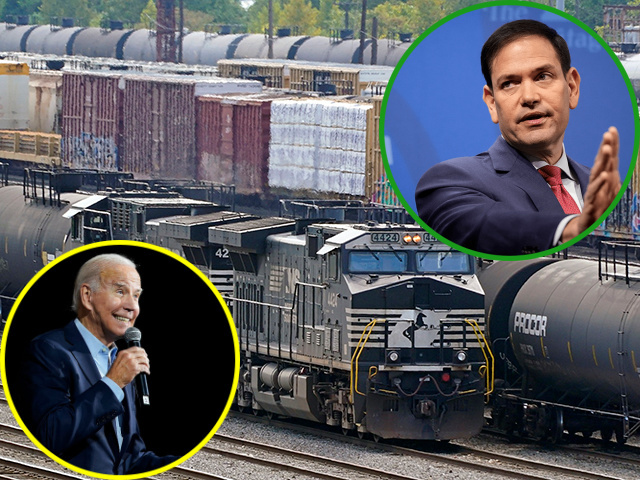Sen. Marco Rubio (R-FL) blasted President Joe Biden for calling on Congress to impose a contract between rail unions and rail companies, which union members ultimately rejected, to avoid a December 9 strike date.
In September, Labor Secretary Marty Walsh brokered a tentative deal between rail unions and carriers while Biden and Transportation Secretary Pete Buttigieg were out of town. His work appeared to have averted what could be a costly rail strike, but the rank-and-file members of four of twelve unions have rejected the tentative agreement.
On Monday, Biden called on Congress to impose the terms of the deal that union members rejected, Politico reported. Rubio ripped Biden for the plea, stating his belief that the parties should negotiate new terms of the contract without congressional involvement and pledged he would only vote for a deal that union members support.
“Just because Congress has the authority to impose a heavy-handed solution does not mean we should. It is wrong for the Biden Administration, which has failed to fight for workers, to ask Congress to impose a deal the workers themselves have rejected,” said the senior senator from Florida.
Rubio asserted that the “whole episode highlights many of the ongoing problems with our economy,” adding:
On the one hand, Wall Street’s drive for efficiency has turned rail workers into little more than line items on a spreadsheet. On the other hand, you have union leadership so disconnected from its rank and file that they struck a deal their members can’t support.
“Instead of relying on Congress to carry their water, the parties should go back to the negotiating table and strike a fair deal that workers can accept,” he concluded.
As Punchbowl News founder Jake Sherman reported Monday, Sen. John Thune (R-SD) shared the same sentiment that Congress should not intervene, stating the matter is the Biden administration’s “responsibility.”
In calling on Congress to impose a contract, Biden, a pro-union Democrat, has effectively disregarded the lingering sick time concerns of union members in fear of substantial economic consequences, which would have further negative impacts on Americans who have already been grappling with inflation not seen for decades.
Sen. Rick Scott (R-FL) called the idea of congressional intervention insane and said he “won’t support it.”
Rail companies, which would benefit from congressional intervention, have estimated that some $2 billion daily would bleed from the American economy during a strike, as the Associated Press reported. A strike would undermine the ability to transport crucial chemicals, packaged food for humans, food for livestock, and retail goods as families get ready for Christmas and Hanukkah, posing a potential political disaster for Biden.
Jared Cassity, the alternate legislative director for SMART Transportation Division, noted last week that he had tapered expectations regarding the rail companies’ willingness to further negotiate with unions, as Bloomberg Law’s Ian Kullgren reported. Cassity added that congressional involvement gives the carriers leverage to withhold concessions.
“I’m not optimistic about the railroads’ willingness to negotiate for more,” Cassity said. “I’m hopeful, but really not that optimistic. And there’s really nothing that obligates them to give more at this point.”
“We’re at the end of the Railway Labor Act, and ultimately the end is a lockout or strike. That’s where we are,” he said.
Brotherhood of Locomotive Engineers and Trainmen President Dennis Pearce echoed Cassity’s sentiment, as CNN Business reported.
“Congress staying out of it would obviously giving [sic] unions leverage,” said Pearce.

COMMENTS
Please let us know if you're having issues with commenting.